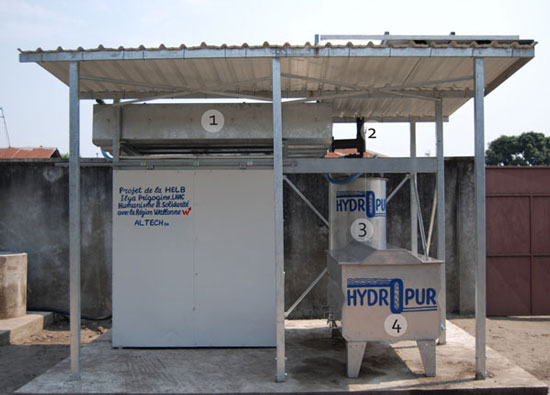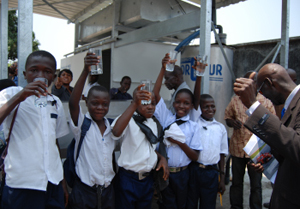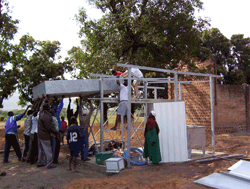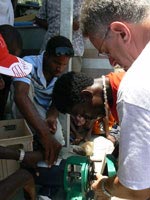HYDROPUR: DRINKING WATER TREATMENT PLANT
The HYDROPUR purifies the water and preserves health. It is a real factor for socio-economic development of rural communities.
Hydropur, is:
- A cylinder of 0.8 m diameter and 2.20 m high.
- Modular design allowing flows from 1 to 20 m³ / h.
- The Hydropur is made of stainless steel to withstand the elements encountered in tropical climates as evidenced by stations installed for almost 20 years.
- No moving parts, which is a guarantee of reliability.
- A galvanized steel tank to supply Hydropur with raw water and a stainless steel tank equipped with 8 taps, which receives and stores treated water.
- The processing techniques it uses are conventional and include steps of coagulation, flocculation, chlorine disinfection, sand filtration and activated carbon filtration. The sand filter is cleaned automatically by a backward current. All processing is done entirely by gravity.
Description station water treatment Hydropur HS1

1. Top Tank
Top Tank The top tray is normally used for aeration, sedimentation of water, and if necessary, coagulation / flocculation, but also plays a buffer role. It is now made of hot galvanized steel.
The controller block allows adjusting the throughput in Hydropur but also to adjust the startup and stopping the feed pump if necessary or even to stop the water treatment in Hydropur when lower tank are filled.
3. The water treatment vessel
Hydropur performs the primary treatment of drinking water chlorination, sand filtration and activated carbon filtration. Chlorinator placed abvove the Hydropur allows the regulation of the chlorine concentration.
4. The lower tank
Like the upper tank, the lower tank is also used as a reserve and allows simultaneous access of several people to drinking water taps. It also allows an additional contact time with the residual chlorine which is an extra security and ensures complete disinfection of the water.
ADVANTAGES OF HYDROPUR
- The modular concept Hydropur can supply between 250 and 10,000 people with drinking water.
- Hydropur uses no external energy is completely autonomous since the treatment process is done by gravity. It can therefore be used in the most remote villages.
- The mobility of the station is a very important asset in the South. Stations can be mounted and dismounted in one day.
- It requires no special maintenance for years. Activated carbon only should be changed after about two years depending on conditions of use. It is very easy to use and requires no technical training.
- The cost of operation of the device is less than € 0.2 to treat 1,000 liters of water
- It is self-cleaning. The sand filter is automatically washed when the system detects an excessive fouling of the filter material and triggers the flushing process (back-wash);
- With its robust structure made of hot galvanized steel and stainless steel, it can withstand severe weather typical of tropical climates.
ALTERNATIVES FOR SUPPLY FOR THE HYDROPUR
The resort is 100% independent and only requires a little labor for the daily management and reloading of disinfectant (which can also be produced on site also autonomously using photovoltaic energy as mentioned above).
In most cases, pumping is necessary. Energy can be supplied either by :
-
The existing power grid and an electric pump (this is the simplest and least costly cases);
-
Alternative energy: wind, solar, hydro or biomass. The use of alternative energy sources is recommended and is the subject of separate quotation because each case is different;
-
Conventional energies generator or pump. We don’t encourage this solution as it is not efficient ecologically and economically.
Please note that in all cases, the energy produced can also be used for other applications such as the production of sodium hypochlorite or installing refrigeration units.


Performances
The Hydropur station helps raw water ( according to A1 standards, A2 and A3 bacteriological level in particular) comply with bacteriological standards for drinking water set by WHO. This has been validated by the CEBEDEAU and the Intermunicipal Water Company of Liege (CILE).
What a Hydropur station can do:
- Treat bacteriologically polluted raw water to allow safe human consumption;
- Treat chemically polluted raw water (depending on the type of pollution and its degree of pollution, possibly including additional treatment) to allow safe human consumption;
- reduce turbidity of raw water (if the water is too heavy, it is possible to use aluminum sulphate in the input tray Hydropur even add pre complementary treatment tank)
Hydropur that a station can not do yet:
- produce drinking water from seawater.
Note that Hydropur station can adapt to any type of water to be treated by adding elements. It is also scalable from a quantitative point of view that could supply 1,000 people with HS1 station 10 000 people with an HS10 station.
TRAINING AND MONITORING
 A project still requires support if it is to succeed. If the facilities and equipment commissioning can easily be done in collaboration with the direct beneficiaries of the project (participatory approach), it is necessary to have a relay locally to monitor and train more intensely engaged communities. It is also necessary to educate and inform the beneficiaries about hygiene in general and the risks associated with waterborne diseases in particular to ensure maximum durability for the different projects. It is also necessary to train and mentor local managers of water treatment plants to ensure maximum sustainability of the project.
A project still requires support if it is to succeed. If the facilities and equipment commissioning can easily be done in collaboration with the direct beneficiaries of the project (participatory approach), it is necessary to have a relay locally to monitor and train more intensely engaged communities. It is also necessary to educate and inform the beneficiaries about hygiene in general and the risks associated with waterborne diseases in particular to ensure maximum durability for the different projects. It is also necessary to train and mentor local managers of water treatment plants to ensure maximum sustainability of the project.
CONTROL OF WATER QUALITY
It is not possible for local managers of Hydropur stations to conduct microbiological analysis of water. These analyses can be performed only by qualified persons with the ad-hoc material. Therefore, the only way to ensure the quality of water for people is to make a measurement of the residual concentration of free chlorine. Indeed, it is this element that is active during the water disinfection. To this end, we provide colorimetric test kits which are very easy to use. The residual concentration also serves to guarantee a prolonged disinfection power after tapping of water by the beneficiary population.
For the same price:
1000 people have access to clean water for life OR two people can travel for a few years.
Water is life and is priceless!